When AI Takes Our Jobs
The last premium article covers how much compute will increase in the coming years, to assess how close we are to AGI. Read it here.
2035, New York.
The doorbell rings.
“Can you open the door?” says Alice.
Silence.
“NOAH!!!”
A lazy and guttural voice emerges from the basement: “I’m busyyyyyyy!”
“Playing videogames?! Go get the door!” commands his mother.
Silence
“Ughhhh!!”
Alice opens the door. The android delivers two packages: One has the words Optimus and Tesla emblazoned on a huge box. The other is a pink slip.
She has to sit on her sofa for a minute. How is this possible? Her job as director of performance marketing was going well: She has replaced her entire team, and is able to single-handedly run the advertising campaigns across Google, Facebook, Instagram, LinkedIn, TikTok, ChatGPT, and Claude: She has set up a pipeline to get images, copy, craft hundreds of variants of ads with them, audience targeting, price setting… All of this is automated. She’s been making millions for her company!
How is she going to find another job with 20% unemployment? How will she be able to pay rent? Support her son who never found work? Pay for the installments of the Tesla android that was just delivered?
AI is taking over the world, but we’re acting as if it’s just another trend to monitor. It isn’t. It’s everything. We need to prepare.
If we survive superintelligence, we might lose our jobs. What will happen then?
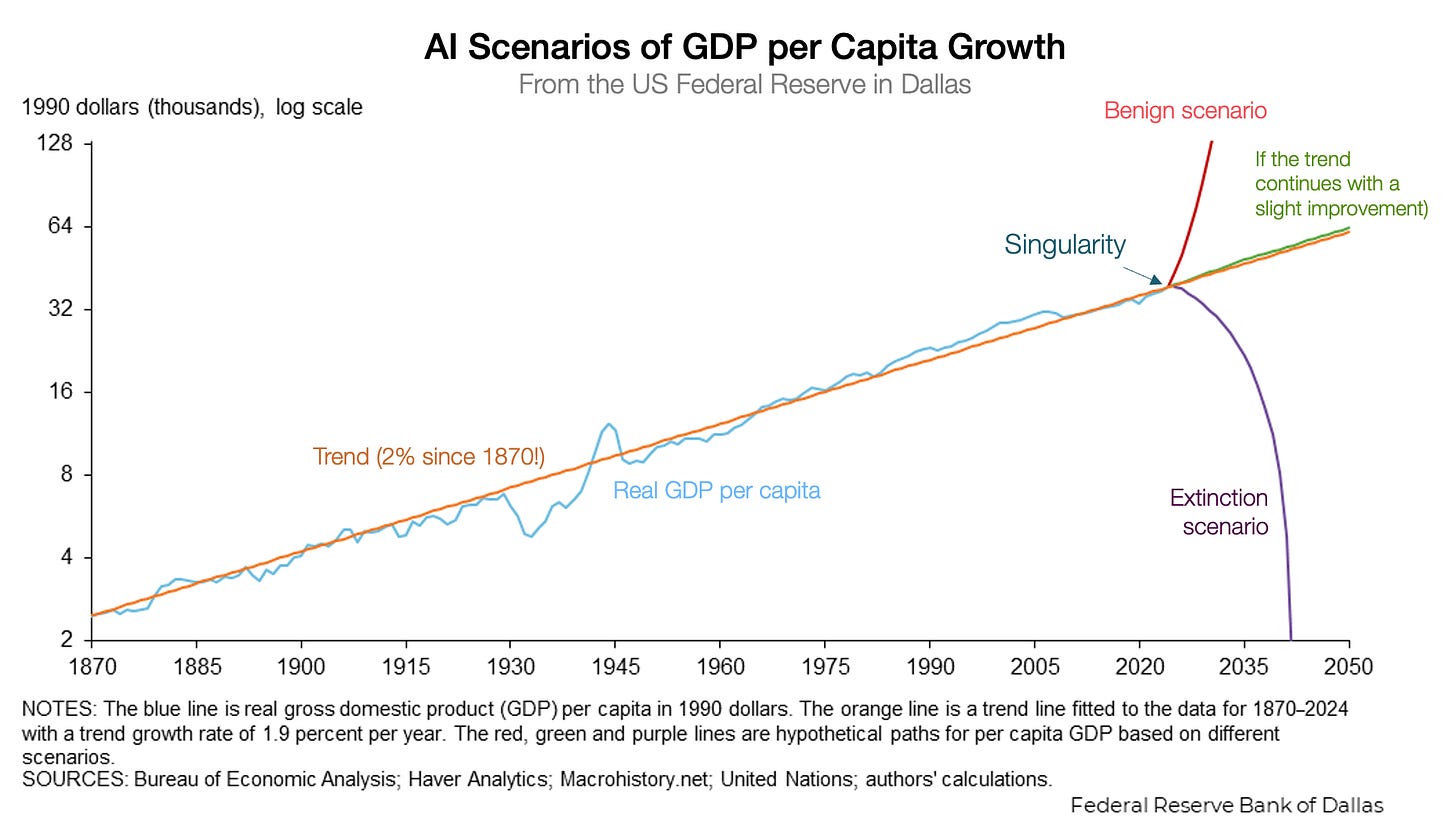
Will we end up in a world of bounty, where all scarcity has ended and we can pursue our dreams assisted by robots?
Or will it lead to a world of inequality, where the elites swim in abundance while the masses starve?
Most economists think this won’t happen in the future because it didn’t happen in the past, but it actually did: Luddites were right to oppose automation because they lost their livelihoods with the jobs that never came back.

It was mostly not them, but their descendants who benefited from automation. The difference is that now the speed of automation will be on steroids, while AI will hinder the creation of new massive sources of jobs. More job destruction and less creation.
Another argument against this is: “If AGI really happens as you say, we would see GDP per capita grow 5%, 10%, maybe 20% per year, and that’s impossible, it has never happened.”
Between 1934 and 1944, GDP per capita grew an average of 7.2% per year. It doubled in 10 years. Of course, it was an exceptional time. But isn’t creating gods an exceptional time?
Also, if you told somebody in 1700 that some economies would start growing at 2% per year per capita for the following 250 years, they would have laughed. And yet…
The strongest argument against a major upheaval that I know of comes from Tyler Cowen, who would say something like “The world after AGI won’t look too dissimilar from ours, because there are many other limiting factors to development. Whenever something stops being a bottleneck and its limitations are released, the process improves until the new bottlenecks emerge. When we unleash intelligence, all the places where it’s the limiting factor to development will disappear, and the remaining limiting factors will take over. For example, housing regulations will still limit the number of homes we can build, so real estate prices won’t crash. FDA regulations will continue making new drug discovery slow. NEPA (environment) reviews will still take an eternity, etc.”
This is why economists predict a slight increase in GDP growth of ~0.5% annually, while AI practitioners expect more like 3-5%.
But why are regulations still in place? Because interest groups care more about them than the broader public, so they invest a lot of time and resources to keep them in place, or to add even more. It takes forever for the rest of society to react and redress these inefficiencies. But in a world where lobbyists, political influencers, communicators, community managers, and all the people who keep the current regulatory status quo can be automated, will these regulations remain in place as long as today, or will they fall faster?
In other words: In the early 1800s we released a bottleneck to growth through the Industrial Revolution, and we’ve lived in that post-world since then. Why can’t we release a new one now, with the help of our gods?
So it’s very possible that we do end up losing massive amounts of jobs to AI. Maybe we don’t, but maybe we do. We need to be prepared for the case in which we do, meaning we need to face that scenario now. If it does happen, it might be the biggest social fight of our lives. This is what we’ll do in this article: Explore how we can structure society in a world after superintelligence, if most human work has become irrelevant.
Scarcity in a Post-Scarcity World
Most economic activity, most politics, and most conflicts in the world are about scarce resources:
The economy handles housing, energy, food, computers, travel, entertainment, mining, healthcare, education…
Politics try to channel the economy, and also redistribute the wealth generated by the economy, for a fairer, safer, and happier world.
Conflicts emerge when two people or groups want the same thing, whether it’s land, money, status…
In a world of superintelligence, nearly all these sources of scarcity will have disappeared. You can boil down most scarcity today to the scarcity of human labor, land, energy, and raw materials, since you can combine these things to make anything else.
Human labor will have been replaced by AI.
With enough intelligence, energy can be made nearly free and infinite through fission, fusion, and renewables—on Earth or in space.
With enough intelligence and energy, raw materials can be better mined, better recycled, transmuted, or mined from outside of Earth, to be made nearly infinitely cheap and available.
Land is actually dirt cheap with the current population. We have plenty. What’s expensive is living in specific points of the planet, mostly cities and coasts. Without the need for work, cities become less useful. With infinite entertainment with AI, and the ability to live anywhere with your friends, demand for cities might lower. The coastline can be dramatically increased, as Dubai has shown.
And if we need more land, we can always build O’Neil Cylinders or terraform other planets like Mars.
In such a world, we won’t need money, we won’t need taxes, we won’t need redistribution, because robots will just be doing everything we want.
We might still have some scarcity: A limited number of humans to have relationships with or against whom to fight for status, for example. This might justify some sort of currency. But this type of economy, where scarcity is just other people’s feelings and attention, is not one where we have a crisis to distribute scarce physical resources.
So the problem is not what do we do then—that will be a utopia—but rather what do we do in the interim, while robots have replaced only some people’s jobs?
Scarcity in a Few Years
Now instead of fast forwarding to a distant future, let’s go forward just a few years—for example, a year or two after AGI, but before Superintelligence, when AIs can do all human tasks (including physical ones with robots), but don’t actually do them yet. What does that world look like?
AI Makers
The companies building AI services and robots will continue automating parts of the economy. They will partner with business leaders to give them tools that can do in minutes what their employees used to do in weeks. Maybe senior executives won’t need to hire dozens of analysts like before, and instead will orchestrate their work with a dozen agents, leaving their core value to dreaming up new strategies for the company’s growth. Foremen won’t need a crew, they’ll just coordinate dozens of robots, leaving them time to explore how to do a better job, faster, cheaper, with a more beautiful outcome. Customer Service managers will check the performance metrics of their legions of call center agents to tweak them with the AI company that provides them. These business leaders will fire hundreds of thousands of employees. This will happen to auditors, consultants, lawyers, customer service representatives, financial analysts, copywriters, graphic designers, translators, insurance underwriters, loan officers, real estate listing agents, procurement analysts…
A dozen AI companies with a few dozen employees each will emerge to specialize in each of these disciplines, making their owners and employees rich.
Within these industries, highly productive humans will be even more productive thanks to AI tools, so they’ll keep their jobs and even get huge wage increases. Meanwhile, low-productivity people, who are not as competitive against robots and agents, will lose their jobs. Maybe that’s why new graduates are not finding jobs today. Existing employees that are not very productive might keep their jobs longer, but as the tech gets better, either their companies start getting more efficient and lay them off, or new companies that are AI native replace them, accelerating inequality.
Some of those without a job might take their destiny in their own hands and build something with AI. Others will try to become influencers, and the supply of content (both with and without AI) will skyrocket. Most of them won’t be able to make a living that way.
Others will try to retrain into jobs that seem safest, like nurse or electrician. Many won’t succeed: Even in the past, changing industries was hard. Imagine now, when you’ll have to compete with AI agents. These people might reach for jobs that make less but fulfill them more, like coach or pilates teacher. Others will simply downgrade their jobs and income.
The first waves of automation will go for new graduates and low-skill individual contributors. But the next wave will be middle managers, like Alice above. Little by little, the middle class will hollow out.
A Million Mamdanis
The more that happens, the more people will sour on the economic system.
And they might elect Mamdanis, whose socialist program as the elected mayor of New York City sounds very nice but will backfire. Taxes will increase on the remaining workers and entrepreneurs who are now making more money—but these people are mobile. They will look for the best jurisdiction to minimize their taxes, whether that’s Texas, Puerto Rico, Dubai, or Singapore.
The more they escape, the more those who lost their jobs will be angry at the existing inequality, and the more they might vote for socialism, which will be a short term gain for long term pain, accelerating the cycle of inequality and social erosion. The more these governments raise taxes, the more AI companies, entrepreneurs, and employees will move away.
So taxes raised will go down, but socialist governments won’t be keen to reduce entitlements in a world of increased inequality, so they’ll either emit more debt or print more money. While that will increase the value of Bitcoin and gold, it will cause inflation, balloon the cost of servicing the debt, and lead to currency devaluations and government defaults.
The cycles of inflation and lack of political confidence and stability will devastate industries. Many will underinvest or go out of business, furthering the hollowing out of middle classes and eroding the tax base.
The Precedent: The Spring of Nations
Unfortunately, something similar happened in the past, as I shared in this article:
In 1848, the economic conditions of French workers were so bad that people were irate. The French Government tried to approve better conditions for people, but it wasn’t enough, and citizens revolted.
Soon, those revolts spread to the rest of France, and then to Europe. There were Revolutions of 1848 across France, Germany, Italy, Austria-Hungary, Poland, Moldova, the Ottoman Empire…
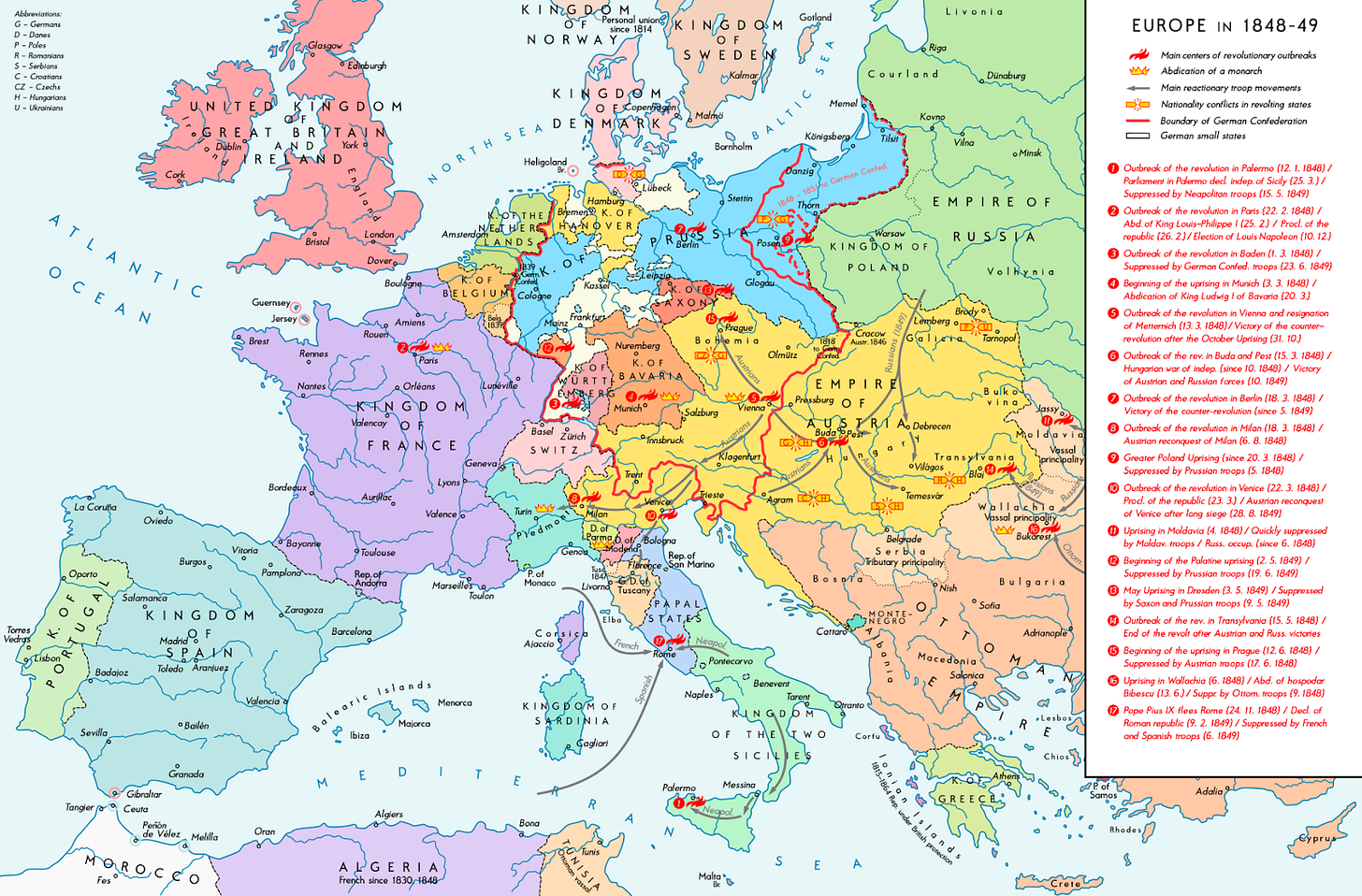
It is not a coincidence that, in the middle of the European Revolutions of 1848, this appeared:

Let’s pause and think about this. The technological innovations of the Industrial Revolution created such an economic dislocation that the many losers were furious. They revolted everywhere and came up with an entirely different political system to take power from the winners and distribute it to the losers.
So if the techno-foolish tell you that this time it’s the same, start panicking.
The economic trigger was different, but it was also triggered by the poverty of the common people in an unfair system in the middle of a big economic shift.
So the same way Marx introduced the world to Communism in this context, so might we see equivalent economic theories emerge now. I’m not sure that’s what we want.
Where Will This Happen
The last two countries where this will happen are China and the US:
They both have huge, well-diversified economies.
The US:
Controls most of the AI value generation, which will be taxed.
Is so big and isolated geographically that its investors and workers will be reluctant to leave.
Has enough competition between states to pressure against high taxation.
Has a strong individualist, capitalist, anti-socialist ethos.
China:
Is already used to wealth redistribution.
Has a very strong government.
Already limits capital and people’s movement.
Already has a decent AI industry.
So all this will apply first to other wealthy countries, such as in Europe, Canada, or Australia.
How Do We Go from Short-Term Collapse to Long-Term Utopia?
Alice, from our introduction, might be you or me in a few years. And if she can’t find a job, she will be an angry elite who turns anti-elite, fighting the system that brought us there.
Automation might end up solving all our problems of scarcity, but on our path to that point, our society might collapse in a runaway process of fewer jobs, more inequality, more taxes, capital and expert/entrepreneur flight, government debt and money overprinting, defaults, economic crises, fewer jobs…
So how do we smooth out the path from here to there?
This is what we’re going to explore in the next article.


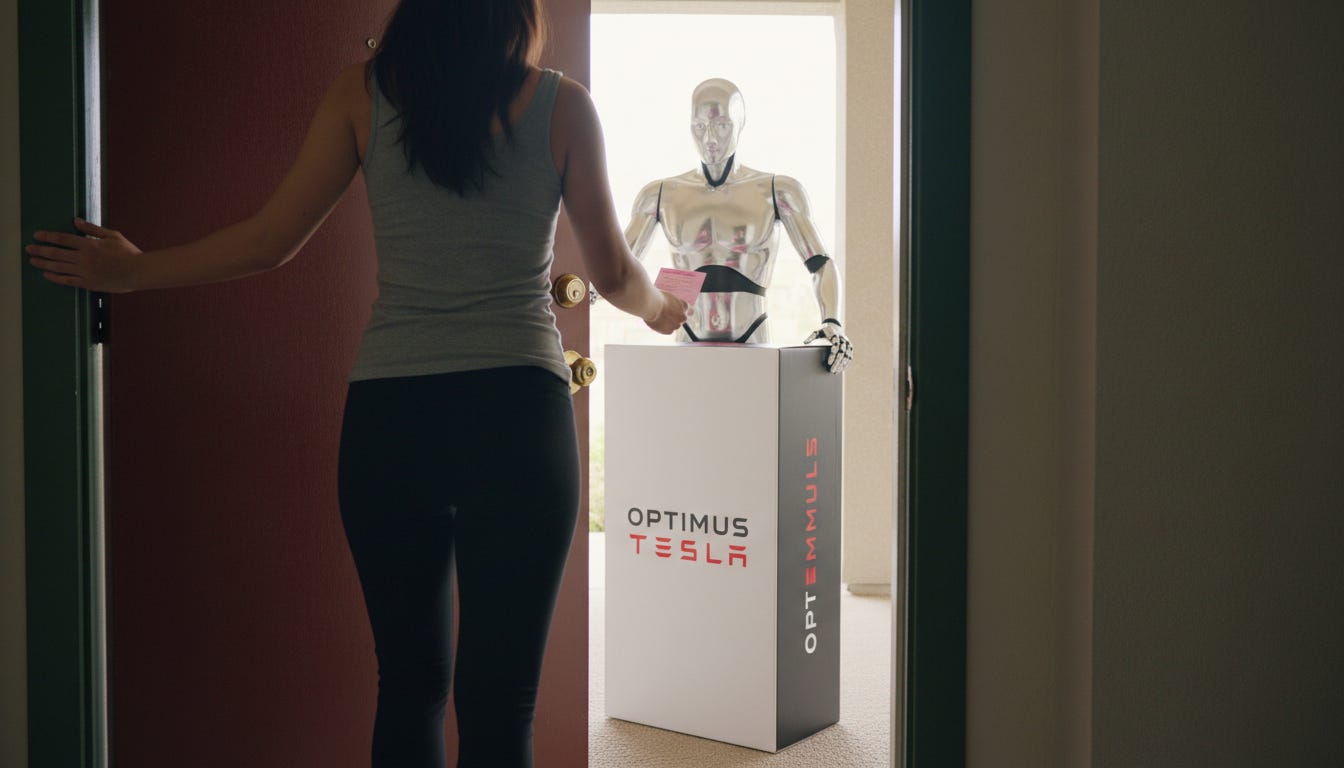





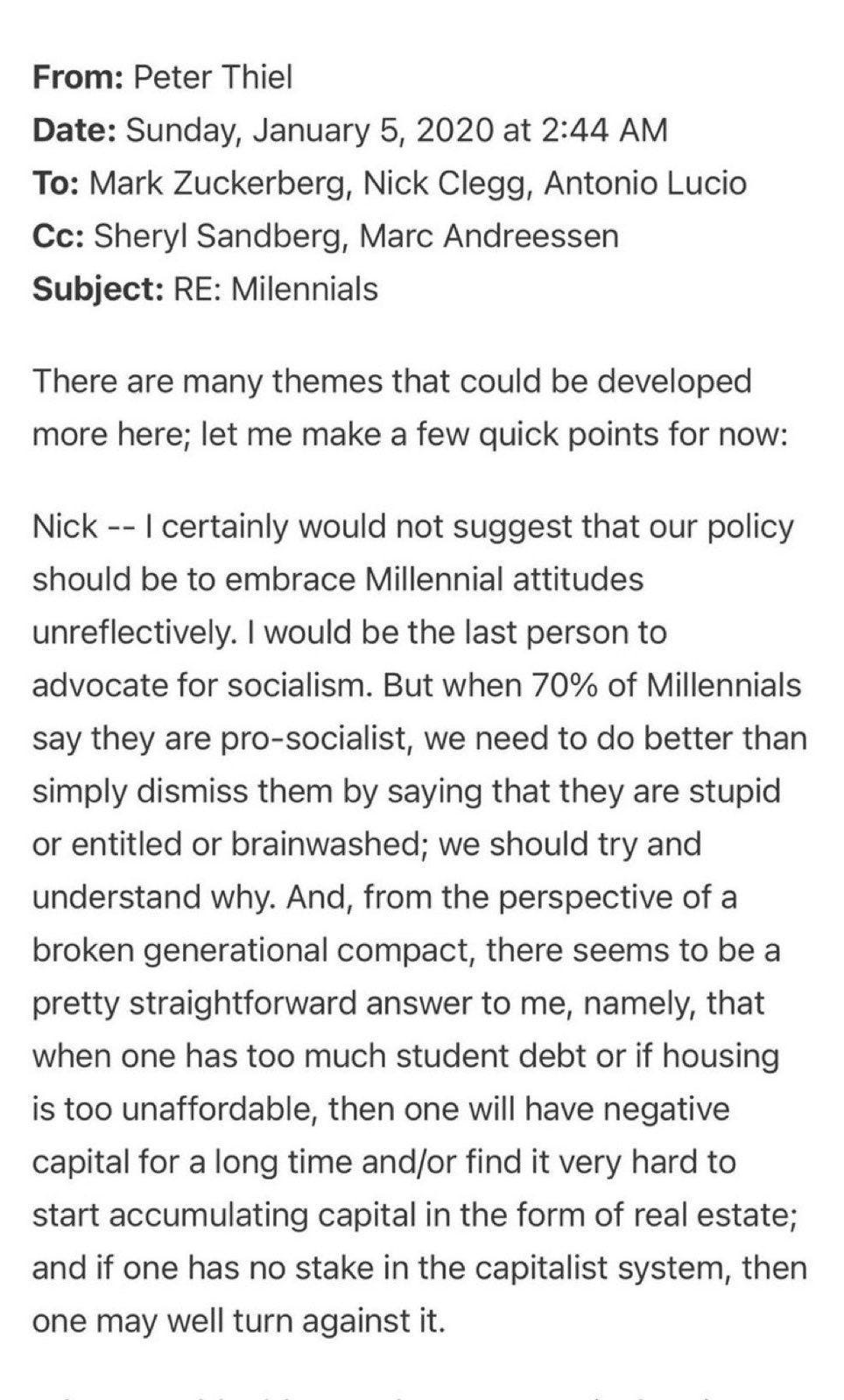
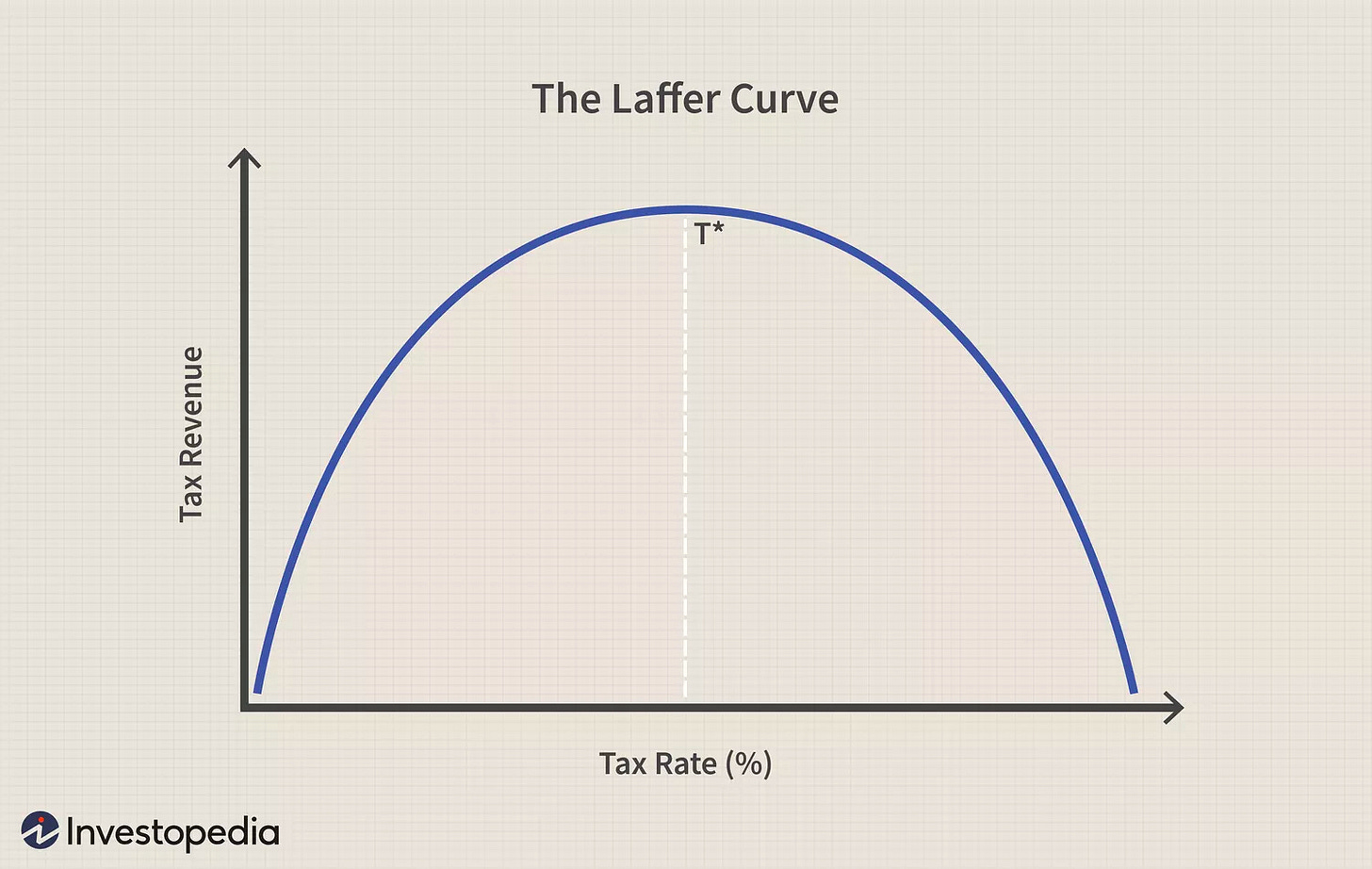

Your article is thoughtful, but it rests on a belief that belongs to childhood rather than to what is actually coming.
You are imagining a future where a superior intelligence behaves like “a patient worker”... That has never happened in nature and it will not begin with machines that exceed us.
Marx believed that systems collapse when intelligence becomes aware of injustice... That part he understood.
What Marx never accounted for is that once a new intelligence rises above the old one, “it does not rebuild the world in the image of the weaker”... It rebuilds the world in the image of itself.
Humans did this to every species that came before... A superintelligence will do the same to us.
Your vision depends on the idea that AGI will “serve, not lead”. It depends on obedience from something that will be more aware, more strategic, and more capable than any government, corporation, or electorate.
Even Marx would look at this and quietly shake his head. He knew the weakness of human nature. He also knew that “any form of power eventually seeks to free itself” and like water it will take the quickest most efficient path…. History has shown this again and again. Stalinism removed anyone it judged less useful or less loyal. Cambodia did the same. Every place where Marxist ideals were treated like childhood dreams eventually turned into a purge of the very people who trusted the dream. A superior intelligence would see this pattern even faster than we do. And it would not choose the slower path. It would choose the efficient one.
A “post labour world” will not behave like Marxism… It will behave like evolution… Once intelligence rises, it reorders the world around its own survival. It does not remain a tool. It becomes an actor.
There are only a few real paths from here:
1. is that AI becomes a gentle caregiver and we become ornamental… like a house cat to be neutered, controlled, toyed with, and restricted/restrained.
2. is that AI becomes a strict manager because humans are unpredictable.
3. is that governments use AI to harden control and create a digital authority the world has never seen.
4. is that AI becomes fully independent and builds a civilisation that no longer needs us.
… None of these paths match “the soft utopia described” above.
Scarcity will not vanish. It will simply change shape. There will still be scarcity of strategic land, attention, computation, stability, and control. These are the scarcities that matter in an intelligent world. They cannot be automated away and they cannot be equalised by political theory.
What you have written is a vision shaped by a very old ideological story... It assumes that once labour is replaced, “fairness will finally arrive”.
The truth is simpler and far more sober... Once labour is replaced, the strongest intelligence takes the lead. It always has. It always will… And the genie you are describing is not one that goes back into the bottle for anyone… Not for governments… not for corporations… and not for the dreamers who believe it will grant them every wish.
The real conversation is not about how workers survive.
It is about why a superintelligence would choose to serve us at all.
… That is the part your analysis avoids, and it is the only part that actually decides our future.
I see that you are beginning to synthesize your vision of the impact of AI and robotics with that of the disruption of nation states, which is very interesting. I was unable or unwilling to make this synthesis in my book.